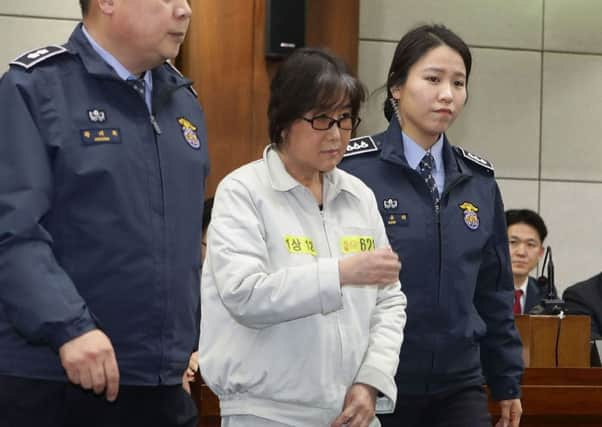South Korean president accused of '˜grave' violation during trial


While the politicians, functioning as prosecutors, argued that Park should be removed from the presidency, her lawyers said the accusations lacked evidence.
Park is accused of colluding with a longtime friend to extort money and favours from companies and allowing her friend to interfere with government affairs.
Advertisement
Hide AdAdvertisement
Hide AdAs the impeachment hearing was taking place, Park’s friend, Choi Soon-sil, appeared in another court in Seoul where she told the judge she denied the allegations against her.
Also in the courtroom were former presidential secretary Ahn Jong-beom, who allegedly pressured companies which gave tens of millions of dollars to foundations Choi controlled, and Jung Ho-sung, charged with passing government secrets to Choi, such as information on ministerial candidates.
The chief prosecutor in the impeachment trial, Kweon Seong Dong, said Park abused her position by “broadly and gravely” violating the constitution to commit corruption and turn state affairs into a profit tool for her friend.
He said Park must be removed from office to repair the damage she had caused to the country’s democracy.
Parliament voted on 9 December to impeach Park, suspending her powers and making the prime minister the government caretaker.
The Constitutional Court has less than six months to decide if Park should be removed or reinstated, and if it removes her, an election has to be held within 60 days.
Park’s lawyer, Lee Joong-hwan, said the accusations stated in the impeachment bill “lack evidence and fail to make legal sense” because they were based on allegations and media reports, not criminal convictions.
The hearing proceeded without Park, who refused to testify for the second time and cannot be forced to do so. The court had planned to hear testimony from four of Park’s former and current aides suspected of helping Choi, but only one appeared.
Advertisement
Hide AdAdvertisement
Hide AdBesides the corruption allegations, the court will also hear accusations included in the impeachment bill that blamed Park for restrictions on media reporting and for government inaction during a 2014 ferry sinking that killed more than 300 passengers.
It has also emerged that South Korea will form a special military brigade this year tasked with removing North Korea’s leadership in the event of war as Seoul looks for options to counter its rival’s nuclear weapons and missiles.
The brigade will aim to remove the North’s wartime command and paralyse its function if war breaks out, according to an official from Seoul’s defence ministry.
The brigade was originally planned to be ready by 2019.
The official refused to say whether the brigade would train to execute pre-emptive strikes.
The plan was included in defence minister Han Min Koo’s policy briefing to Prime Minister Hwang Kyo-ahn, who became government caretaker upon President Park Geun-hye’s impeachment.
North Korea conducted two nuclear tests and a series of rocket test firings last year in attempts to expand its nuclear weapons and missile programme.
Following the North’s latest nuclear test in September, South Korea’s Joint Chiefs of Staff announced plans to strengthen its ability to conduct pre-emptive strikes. It also said that their system would use special forces and cruise missiles now under development to destroy areas where North Korean leader Kim Jong Un and the rest of the country’s decision-makers are located.